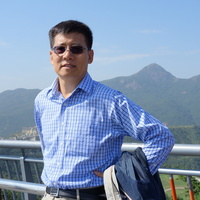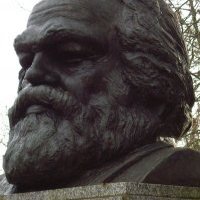
Chenyang Li
I am a professor of philosophy at Nanyang Technological University, specializing in Chinese philosophy and comparative philosophy.
Phone: (65) 69047499
Address: Li Chenyang
School of Humanities
Nanyang Technological University
48 Nanyang Drive
Singapore 639818
Phone: (65) 69047499
Address: Li Chenyang
School of Humanities
Nanyang Technological University
48 Nanyang Drive
Singapore 639818
less
Related Authors
Andreas Umland
National University of "Kyiv-Mohyla Academy"
David Seamon
Kansas State University
Armando Marques-Guedes
UNL - New University of Lisbon
Andrew W Wilkins
Goldsmiths, University of London
Peter D. Thomas
Brunel University
André Bueno
UERJ - Universidade do Estado do Rio de Janeiro / Rio de Janeiro State University
Fabian Heubel 何乏筆
Academia Sinica
Juraj Marušiak
Slovak Academy of Sciences
Ruben Apressyan
The Institute of Philosophy of the Russian Academy of Sciences
Armin Selbitschka
Ludwig-Maximilians-Universität München
InterestsView All (10)










Uploads
Papers by Chenyang Li
世界哲学的主要任务在于使中国哲学成为在世界哲学舞台上构建当代哲学思想的重要有机部分,并做出贡献。为了实现这个⽬标,我们必须防⽌中国哲学的历史化,即不可以把中国哲学的研究仅仅局限于思想史的研究,也不可以仅仅⽤历史的⽅法解决哲学的问题。同时,⽐较哲学是推动中国哲学成为世界哲学的重要途径。
the Confucian concept of ren in terms of care as it is formulated in classic texts. Then I respond to challenges, including opposing views from influential care ethicists Nel Noddings and Virginia Held. I also discuss some promising studies to further this discourse.
世界哲学的主要任务在于使中国哲学成为在世界哲学舞台上构建当代哲学思想的重要有机部分,并做出贡献。为了实现这个⽬标,我们必须防⽌中国哲学的历史化,即不可以把中国哲学的研究仅仅局限于思想史的研究,也不可以仅仅⽤历史的⽅法解决哲学的问题。同时,⽐较哲学是推动中国哲学成为世界哲学的重要途径。
the Confucian concept of ren in terms of care as it is formulated in classic texts. Then I respond to challenges, including opposing views from influential care ethicists Nel Noddings and Virginia Held. I also discuss some promising studies to further this discourse.
https://academic.oup.com/book/49411
The volume comprises thirteen essays that examine harmony against different cultural and disciplinary backgrounds. A broad variety of cultural traditions are represented, including the Confucian, Daoist, Buddhist, Judaist, Greek, Christian, Islamic, African, and Native American traditions. The volume's essays also represent different disciplinary approaches, such as philosophy, religious studies, linguistics, psychology, and political theory. Each contribution focuses on some aspect of what harmony as a personal trait, social disposition, or environmental outlook entails and describes how the virtue may be cultivated-either by examining the way in which it has been discussed in specific traditions of ethical, religious, or political thought, or by developing a cross-cultural analysis of the theory and practice of the virtue of harmony.
The book traces the roots of the concept to antiquity, examines its subsequent development, and explicates its theoretical and practical significance for the contemporary world. It argues that, contrary to a common view in the West, Confucian harmony is not mere agreement but has to be achieved and maintained with creative tension. Under the influence of a Weberian reading of Confucianism as "adjustment" to a world with an underlying fixed cosmic order, Confucian harmony has been systematically misinterpreted in the West as presupposing an invariable grand scheme of things that pre-exists in the world to which humanity has to conform. The book shows that Confucian harmony is a dynamic, generative process, which seeks to balance and reconcile differences and conflicts through creativity.
Illuminating one of the most important concepts in Chinese philosophy and intellectual history, this book is of interest to students of Chinese studies, history and philosophy in general and eastern philosophy in particular.
schools of thought, including Daoism, Confucianism, Legalism, Mohism, Buddhism, and trace their impact on contemporary Chinese philosophy. The volume explores the various meanings and implications of harmony so as to consider its relevance as a value and virtue in the modern world. It provides an accessible but substantial introductory work for readers interested in learning about pertinent core concepts and theories in Chinese thought, as well as engages specialists in Chinese philosophy by explicating its implications for ethical, political, epistemological, and
metaphysical reflection as the basic point of reference.
和,是中国传统思想的核心概念。时至今日,这个概念仍然塑造着中国乃至东亚的伦理政治思想。然而,学界一直欠缺一部对和的系统阐释,以全面呈现它在各中国思想学派中的重要性和地位。这部编著试图完成这项工作,书中各章涵盖了道家、儒家、法家、墨家、佛教中对“和”的观念的探讨和运用,乃至这些思想遗产在当代中国哲学的影响。通过这个横跨各学派的综合研究,本书探索了“和”的各种含义和意涵,并考察了“和”作为一个价值和德性的当代意义。从“和”的哲学探讨中,更可以折射出传统中国哲学中的伦理学、政治哲学、认识论,乃至形而上学。这部深入浅出的引论适合对中国传统思想哲学有兴趣的入门者和研究专家。
1. Introduction by C Li and D. Düring
2. Itay Shani, The Lure of Beauty: Harmony as a Conduit of Self-
transcendence
3. Jörg Löschke, Harmony, Organic Unity, and Intrinsic Value
4. Dascha Düring, Harmony and Justice
5. Tak-lap Yeung, Two Conceptions of Harmony
6. Shuchen Xiang, Race and Harmony
7. Alice Simionato, Harmony and Li (Coherence)
8. Olivier Malherbe, Gestalt, Harmony and human Action in Roman
Ingarden’s Thought
Book Review by Han Shu-an: Comprehensive Harmony Thomé H.
Fang’s Philosophy